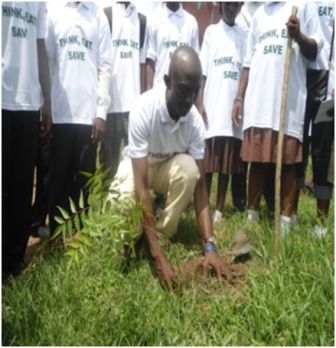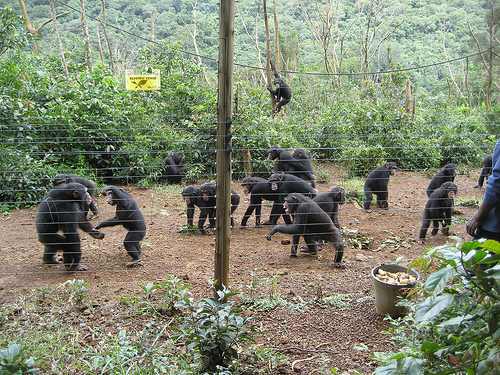COP17: For Nigeria climate change adaptation not mitigation is priority
When one hears the way certain people agitate about climate change in Nigeria, it usually seem as if it is our biggest problem or that it is an issue peculiar to us. Climate change everyone knows is a serious issue and threatens existence on planet earth if Green House Gas (GHG) emissions are not effectively curbed.
Burning of fossil fuels from the beginning of the industrial age led to further accumulation of GHG in the troposphere, (the lowest part of the earth’s atmosphere about 10 – 19km above sea level). These human-induced GHGs have added to the number of GHGs naturally existing in the troposphere helping to keep the earth warm for sustenance of major life forms.
More GHGs result in more heat trappings and are the main cause of global warming as we have it. Global warming according to studies is responsible for fractional rise in the average temperature of the earth since around 1950 and is said to be responsible for various weather deviations like recurrent deluge, blizzards, etc.
Nigeria is a developing economy and has issues to tackle to upgrade from this status; Nigeria also needs to catch up with emerging trends around the world.
Climate change in Nigeria is said to be responsible for erosion, floods, drought and desertification.
Climate change adaptation submits that support and infrastructure are put in place in event of these desolations. Adapting to climate change for Nigeria is not completely an issue of climate change but an issue of development in fixes that will improve the quality of lives in the country. So with or without climate change, Nigeria needs to improve on infrastructure which will see climate change adaptation benefit.
Nigeria has a high population power submitting a substantial emission share of the total in Africa and (to a fair extent) around the world. Climate change mitigation by sharp cuts in emissions is a rigorous move Nigeria may not be able to afford until next decade, so Nigeria as a developing economy and as a top polluting nation in Africa needs little agitation for the whole climate change thing.
Nigeria is a member of the United Nations and joins in recent year-end meetings conveyed by the UN to have nations agree in a deal to curb emissions. These meetings also feature talks on carbon credit, carbon trading and technology transfer.
Developing nations that believe they are the most hurt in event of climate change tell developed nations that are also top polluters to commit funds to help them adapt to climate change. This has seen some progress and may be more effective towards the middle or this decade.
Climate change response and anything that has to do with funds between economies makes the issue more complicated in this financially straitened world. No nation on earth is a “kid” and has governments with obligation for development, laying climate change as an opportunity for support makes some sense but may eventually be goof to be unveiled.
Adaptationshould be supreme if Nigeria is talking climate change. Adaptation here comes because of ‘climate change’ but the original objective should be development using smarter solutions and designs. Why will a road construction project be awarded without considering current environmental trends and future projections?
Why will a drainage channel construction and maintenance not be a priority for areas prone to floods and erosion? Will climate change also be blamed in event of these desolations without adequate precaution for the future? Developing economies usually blame developed economies for the global climate woes but contributes around 50% of GHGs presently.
China is a developing economy and a top carbon emitter in the world, China for the coming COP17 cancels any hope of a deal and passes blame of un-seriousness to developed nations. ‘If’ developed nations agree within the next few days for a deal, can China do seeing the contribution of coal and fossil fuels to industries in China and to part of living conditions in rural China.
Nigeria if passing blame also needs to look back a little and ask if we can cope ‘if’ a legally binding MRV (Measurement, Reporting and Verification) is ratified at the COP17 conference. Energy emitted from houses around the country where changes can’t for now come, increasing tons of emissions from vehicles in cities that spend hours in traffic daily and many more.
The belief is that conditions for parties to the UN deal will be different for their emission share and level of development; this should be appropriate but no one might want to ‘play the fool’ for other nations hiding under the cover of ‘developing’ for infrastructural setting. India for example is a developing economy and is a top polluting nation so how is that really placed. These factors and more are making the UN deal complicated towards ratification anytime soon.
Developed nations are onto reality positing 2020 as a time for a legally binding deal for many reasons. Most developing nations should also get into the shades of reality by avoiding bickering that make it seem like other-than-a-deal goal in pursued. A suggestion already presents that Top Polluting Nations meet in 2012 for talks on how to move backward from their emission average.
This meeting will involve leaders and not ministers and will include nations like India, Nigeria, China, South Africa, Japan, USA and a little more. This meeting will submit all possibilities and present more talks than the COP17 meeting with differing purpose.
There are so many issues lined with climate change and the front-liners whose steps should encourage Nigeria and a few developing nations for action are into issues that they probably believe are more important than a changing climate and a more complicated weather.
Nigeria instead of staying in this oscillating global warming debate should purse development and advancement rigorously which at the latter end will benefit adaptation and mitigation efforts; this also will make Nigeria better prepared when the front-liners are ready for concerted effort.
Related Links:
Climate Change Mitigation and Adaptation in Nigeria
Top Polluters Nations Talk in 2012 for Climate Change
Stay with Sierra Express Media, for your trusted place in news!
© 2011, https:. All rights reserved.





